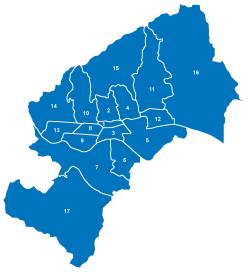Districts of Zagreb
| Districts of Zagreb | |
|---|---|
 |
Zagreb is split into seventeen administrative divisions called districts (Croatian: Gradske četvrti). The city district, along with local councils, is a form of local self-government in the City of Zagreb through which citizens participate in the decision-making process in a self-governing areas of the City and local affairs that directly affect their lives. The city district is established for an area that represents urban, economic and social entity, which is linked to the common interests of citizens. The current division was established by the Statute of the City of Zagreb on 14 December 1999. Legally, a city district is a legal person who has its own governing bodies.
Bodies that manage districts are District Council and President of the District Council.
District councils have between 11 and 19 members, depending on the number of inhabitants, namely:
Councillors are elected by the citizens who live in the district area at a general, free, secret and direct ballot every four years.
The Council autonomously issues the rules of the district, enacts the financial plan and final account, decides on the disposal of the districts property, introduces a plan of small communal actions (construction and maintenance of smaller communal infrastructure facilities and public buildings which improve the living standard of citizens) and determines the priority in their realization, elects its president and vice presidents, convenes the local meetings of the citizens, organizes and implements civil defense, coordinates the work of the local committees, issues its own work program and report, works with other city districts, cooperates with associations in its area, proposes the concept of development of its district within the Development plan of the City of Zagreb, proposes solutions for the problems in the procedures of drafting and issuing spatial and other planning documents and their realization in its area, monitors the status of district infrastructure and proposes programs for its development, cares for quality of housing, communal facilities and infrastructure, performs municipal and other service activities of significance for its district, takes care of the needs of the population in education, public health, social welfare, culture and sport, monitors measures and actions to protect and improve the environment and living conditions in the district, proposes measures for more efficient functioning of district services, proposes the establishment of institutions in the fields of care of preschool children, education, public health, social welfare, culture and sports, proposes the renaming of streets, public transport areas, parks, sports grounds, schools, kindergartens, cultural institutions and all other facilities in its district, may propose areas within its district in which local committees could be established, proposes change of area of the district or the local committees, and proposes the candidates for the jurors.
...
Wikipedia
